Entrepreneurship and Small Business Management
VerifiedAdded on 2023/06/14
|14
|2691
|213
AI Summary
This report covers types of entrepreneurs, their similarities and differences, impact of small and micro business on economy, and benefits of business start-ups and small businesses on social economy. It also reflects on skills, traits, and characteristics of chosen entrepreneurs. Subject: Entrepreneurship and Small Business Management. Course Code: Unknown. Course Name: Unknown. College/University: Unknown.
Contribute Materials
Your contribution can guide someone’s learning journey. Share your
documents today.

Entrepreneurship and
Small Business
Management
Small Business
Management
Secure Best Marks with AI Grader
Need help grading? Try our AI Grader for instant feedback on your assignments.
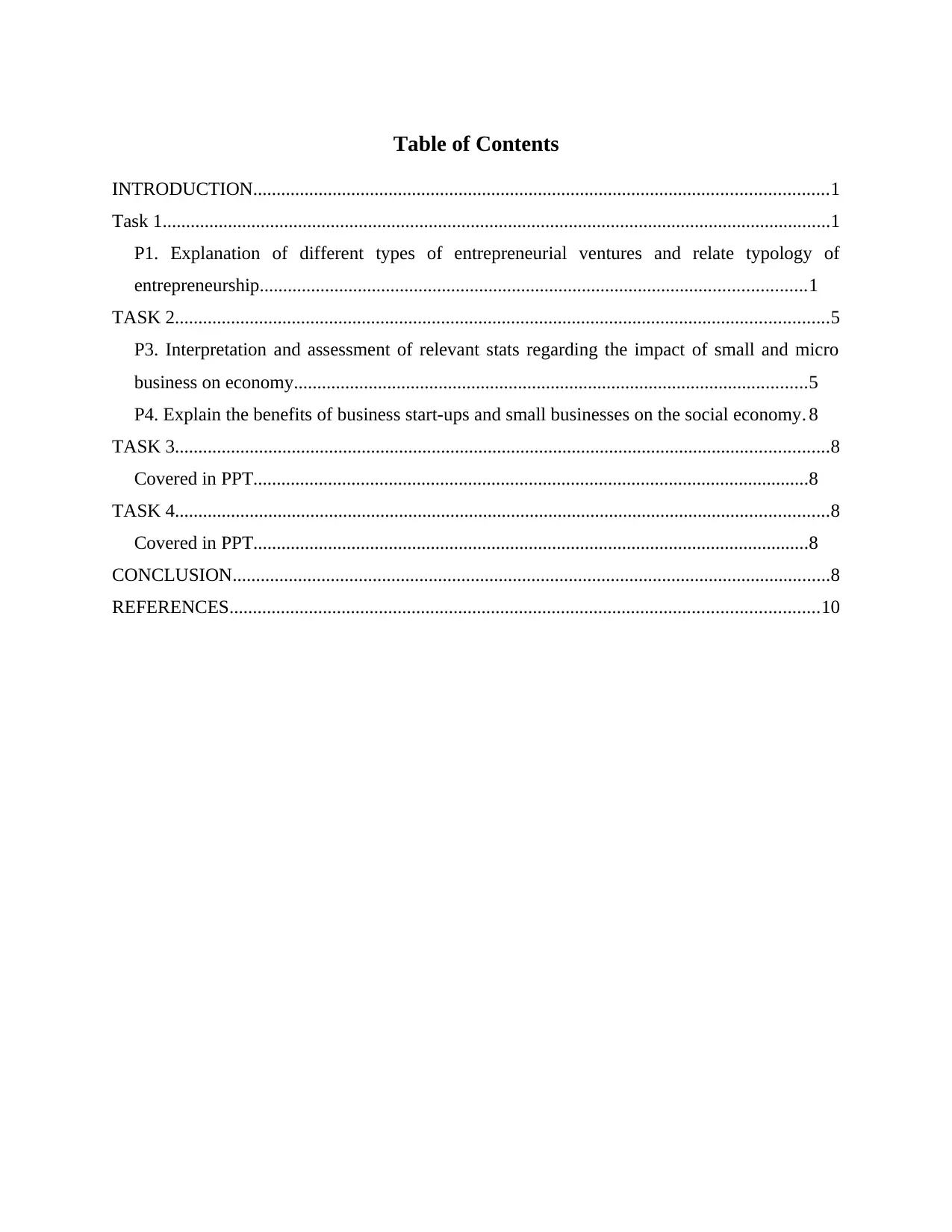
Table of Contents
INTRODUCTION...........................................................................................................................1
Task 1...............................................................................................................................................1
P1. Explanation of different types of entrepreneurial ventures and relate typology of
entrepreneurship.....................................................................................................................1
TASK 2............................................................................................................................................5
P3. Interpretation and assessment of relevant stats regarding the impact of small and micro
business on economy..............................................................................................................5
P4. Explain the benefits of business start-ups and small businesses on the social economy. 8
TASK 3............................................................................................................................................8
Covered in PPT.......................................................................................................................8
TASK 4............................................................................................................................................8
Covered in PPT.......................................................................................................................8
CONCLUSION................................................................................................................................8
REFERENCES..............................................................................................................................10
INTRODUCTION...........................................................................................................................1
Task 1...............................................................................................................................................1
P1. Explanation of different types of entrepreneurial ventures and relate typology of
entrepreneurship.....................................................................................................................1
TASK 2............................................................................................................................................5
P3. Interpretation and assessment of relevant stats regarding the impact of small and micro
business on economy..............................................................................................................5
P4. Explain the benefits of business start-ups and small businesses on the social economy. 8
TASK 3............................................................................................................................................8
Covered in PPT.......................................................................................................................8
TASK 4............................................................................................................................................8
Covered in PPT.......................................................................................................................8
CONCLUSION................................................................................................................................8
REFERENCES..............................................................................................................................10
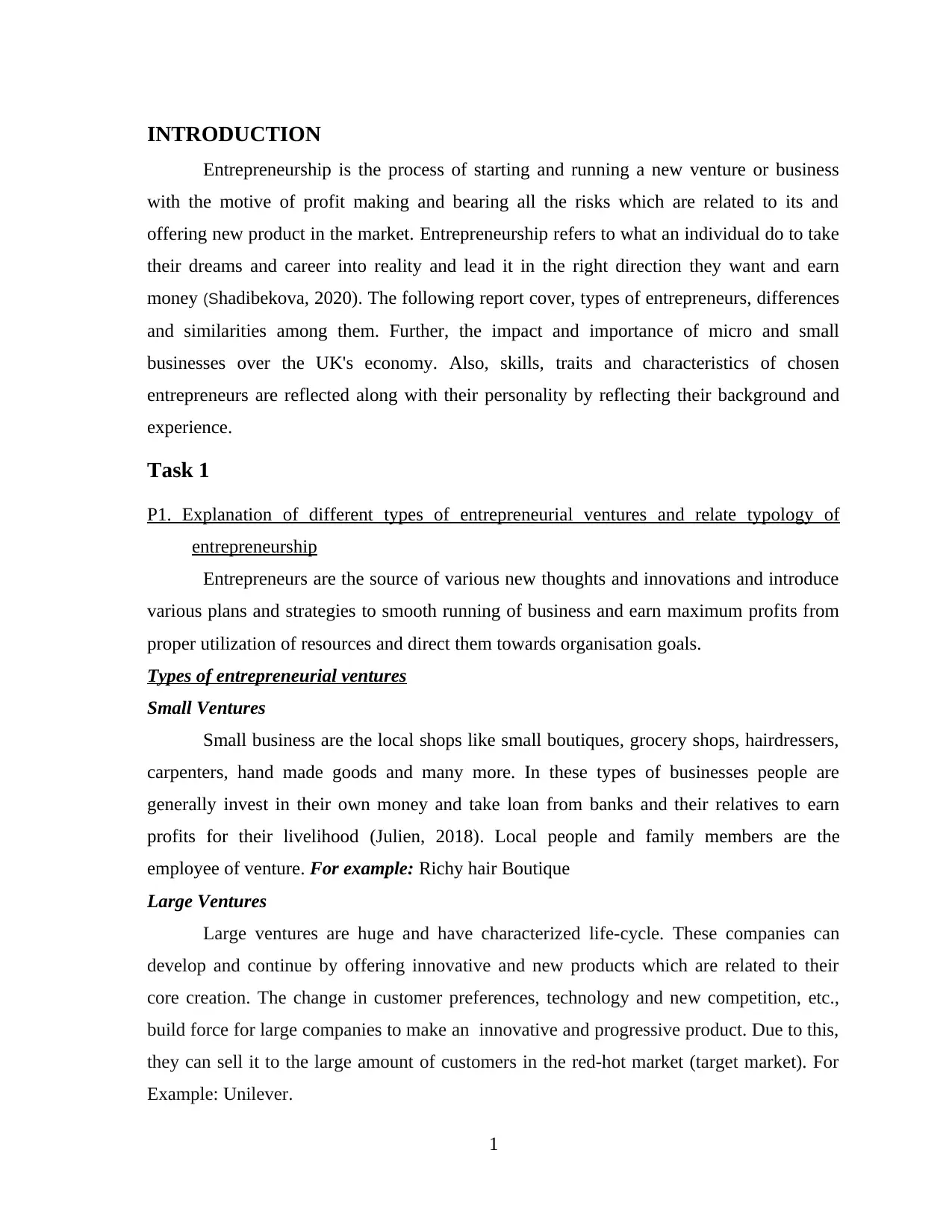
INTRODUCTION
Entrepreneurship is the process of starting and running a new venture or business
with the motive of profit making and bearing all the risks which are related to its and
offering new product in the market. Entrepreneurship refers to what an individual do to take
their dreams and career into reality and lead it in the right direction they want and earn
money (Shadibekova, 2020). The following report cover, types of entrepreneurs, differences
and similarities among them. Further, the impact and importance of micro and small
businesses over the UK's economy. Also, skills, traits and characteristics of chosen
entrepreneurs are reflected along with their personality by reflecting their background and
experience.
Task 1
P1. Explanation of different types of entrepreneurial ventures and relate typology of
entrepreneurship
Entrepreneurs are the source of various new thoughts and innovations and introduce
various plans and strategies to smooth running of business and earn maximum profits from
proper utilization of resources and direct them towards organisation goals.
Types of entrepreneurial ventures
Small Ventures
Small business are the local shops like small boutiques, grocery shops, hairdressers,
carpenters, hand made goods and many more. In these types of businesses people are
generally invest in their own money and take loan from banks and their relatives to earn
profits for their livelihood (Julien, 2018). Local people and family members are the
employee of venture. For example: Richy hair Boutique
Large Ventures
Large ventures are huge and have characterized life-cycle. These companies can
develop and continue by offering innovative and new products which are related to their
core creation. The change in customer preferences, technology and new competition, etc.,
build force for large companies to make an innovative and progressive product. Due to this,
they can sell it to the large amount of customers in the red-hot market (target market). For
Example: Unilever.
1
Entrepreneurship is the process of starting and running a new venture or business
with the motive of profit making and bearing all the risks which are related to its and
offering new product in the market. Entrepreneurship refers to what an individual do to take
their dreams and career into reality and lead it in the right direction they want and earn
money (Shadibekova, 2020). The following report cover, types of entrepreneurs, differences
and similarities among them. Further, the impact and importance of micro and small
businesses over the UK's economy. Also, skills, traits and characteristics of chosen
entrepreneurs are reflected along with their personality by reflecting their background and
experience.
Task 1
P1. Explanation of different types of entrepreneurial ventures and relate typology of
entrepreneurship
Entrepreneurs are the source of various new thoughts and innovations and introduce
various plans and strategies to smooth running of business and earn maximum profits from
proper utilization of resources and direct them towards organisation goals.
Types of entrepreneurial ventures
Small Ventures
Small business are the local shops like small boutiques, grocery shops, hairdressers,
carpenters, hand made goods and many more. In these types of businesses people are
generally invest in their own money and take loan from banks and their relatives to earn
profits for their livelihood (Julien, 2018). Local people and family members are the
employee of venture. For example: Richy hair Boutique
Large Ventures
Large ventures are huge and have characterized life-cycle. These companies can
develop and continue by offering innovative and new products which are related to their
core creation. The change in customer preferences, technology and new competition, etc.,
build force for large companies to make an innovative and progressive product. Due to this,
they can sell it to the large amount of customers in the red-hot market (target market). For
Example: Unilever.
1
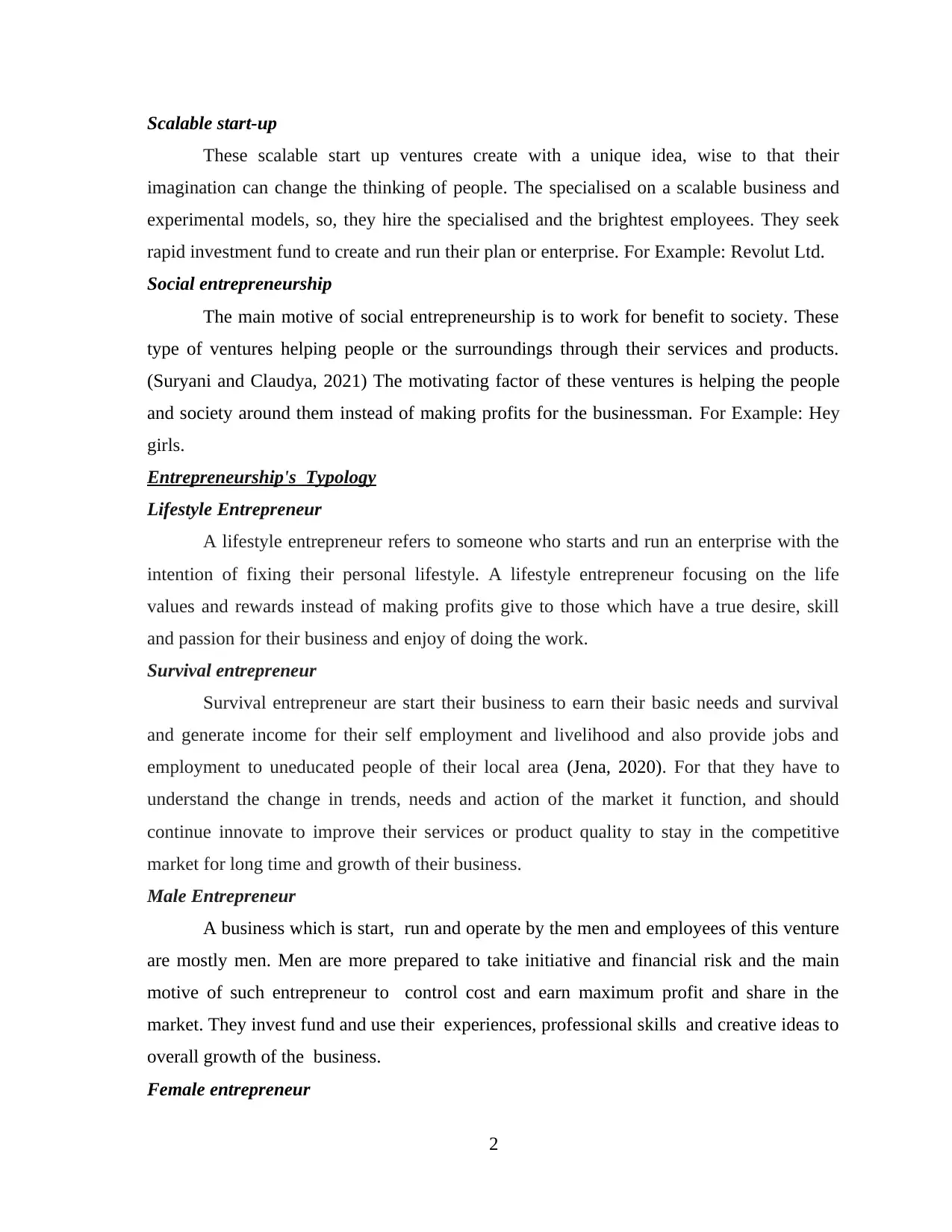
Scalable start-up
These scalable start up ventures create with a unique idea, wise to that their
imagination can change the thinking of people. The specialised on a scalable business and
experimental models, so, they hire the specialised and the brightest employees. They seek
rapid investment fund to create and run their plan or enterprise. For Example: Revolut Ltd.
Social entrepreneurship
The main motive of social entrepreneurship is to work for benefit to society. These
type of ventures helping people or the surroundings through their services and products.
(Suryani and Claudya, 2021) The motivating factor of these ventures is helping the people
and society around them instead of making profits for the businessman. For Example: Hey
girls.
Entrepreneurship's Typology
Lifestyle Entrepreneur
A lifestyle entrepreneur refers to someone who starts and run an enterprise with the
intention of fixing their personal lifestyle. A lifestyle entrepreneur focusing on the life
values and rewards instead of making profits give to those which have a true desire, skill
and passion for their business and enjoy of doing the work.
Survival entrepreneur
Survival entrepreneur are start their business to earn their basic needs and survival
and generate income for their self employment and livelihood and also provide jobs and
employment to uneducated people of their local area (Jena, 2020). For that they have to
understand the change in trends, needs and action of the market it function, and should
continue innovate to improve their services or product quality to stay in the competitive
market for long time and growth of their business.
Male Entrepreneur
A business which is start, run and operate by the men and employees of this venture
are mostly men. Men are more prepared to take initiative and financial risk and the main
motive of such entrepreneur to control cost and earn maximum profit and share in the
market. They invest fund and use their experiences, professional skills and creative ideas to
overall growth of the business.
Female entrepreneur
2
These scalable start up ventures create with a unique idea, wise to that their
imagination can change the thinking of people. The specialised on a scalable business and
experimental models, so, they hire the specialised and the brightest employees. They seek
rapid investment fund to create and run their plan or enterprise. For Example: Revolut Ltd.
Social entrepreneurship
The main motive of social entrepreneurship is to work for benefit to society. These
type of ventures helping people or the surroundings through their services and products.
(Suryani and Claudya, 2021) The motivating factor of these ventures is helping the people
and society around them instead of making profits for the businessman. For Example: Hey
girls.
Entrepreneurship's Typology
Lifestyle Entrepreneur
A lifestyle entrepreneur refers to someone who starts and run an enterprise with the
intention of fixing their personal lifestyle. A lifestyle entrepreneur focusing on the life
values and rewards instead of making profits give to those which have a true desire, skill
and passion for their business and enjoy of doing the work.
Survival entrepreneur
Survival entrepreneur are start their business to earn their basic needs and survival
and generate income for their self employment and livelihood and also provide jobs and
employment to uneducated people of their local area (Jena, 2020). For that they have to
understand the change in trends, needs and action of the market it function, and should
continue innovate to improve their services or product quality to stay in the competitive
market for long time and growth of their business.
Male Entrepreneur
A business which is start, run and operate by the men and employees of this venture
are mostly men. Men are more prepared to take initiative and financial risk and the main
motive of such entrepreneur to control cost and earn maximum profit and share in the
market. They invest fund and use their experiences, professional skills and creative ideas to
overall growth of the business.
Female entrepreneur
2
Secure Best Marks with AI Grader
Need help grading? Try our AI Grader for instant feedback on your assignments.
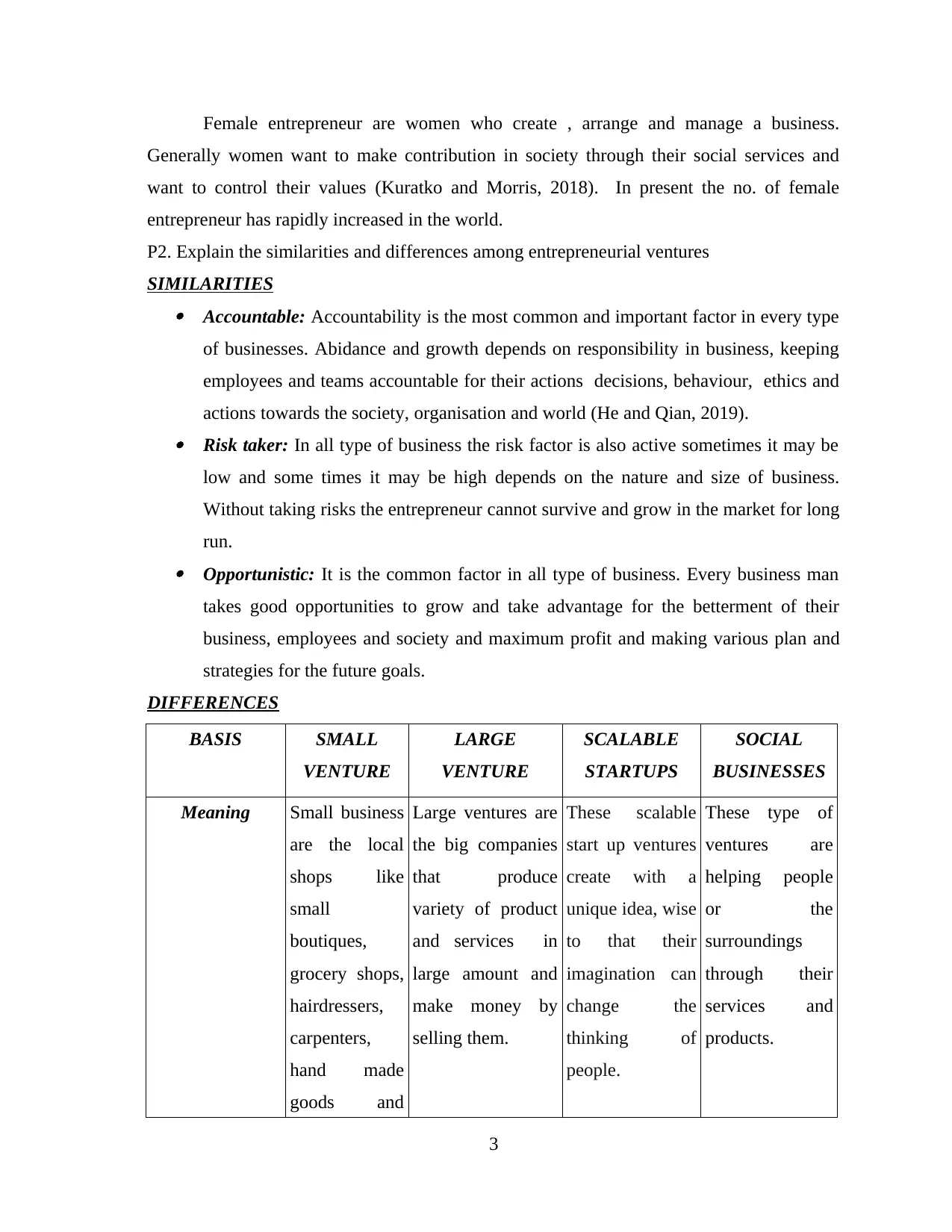
Female entrepreneur are women who create , arrange and manage a business.
Generally women want to make contribution in society through their social services and
want to control their values (Kuratko and Morris, 2018). In present the no. of female
entrepreneur has rapidly increased in the world.
P2. Explain the similarities and differences among entrepreneurial ventures
SIMILARITIES
Accountable: Accountability is the most common and important factor in every type
of businesses. Abidance and growth depends on responsibility in business, keeping
employees and teams accountable for their actions decisions, behaviour, ethics and
actions towards the society, organisation and world (He and Qian, 2019).
Risk taker: In all type of business the risk factor is also active sometimes it may be
low and some times it may be high depends on the nature and size of business.
Without taking risks the entrepreneur cannot survive and grow in the market for long
run.
Opportunistic: It is the common factor in all type of business. Every business man
takes good opportunities to grow and take advantage for the betterment of their
business, employees and society and maximum profit and making various plan and
strategies for the future goals.
DIFFERENCES
BASIS SMALL
VENTURE
LARGE
VENTURE
SCALABLE
STARTUPS
SOCIAL
BUSINESSES
Meaning Small business
are the local
shops like
small
boutiques,
grocery shops,
hairdressers,
carpenters,
hand made
goods and
Large ventures are
the big companies
that produce
variety of product
and services in
large amount and
make money by
selling them.
These scalable
start up ventures
create with a
unique idea, wise
to that their
imagination can
change the
thinking of
people.
These type of
ventures are
helping people
or the
surroundings
through their
services and
products.
3
Generally women want to make contribution in society through their social services and
want to control their values (Kuratko and Morris, 2018). In present the no. of female
entrepreneur has rapidly increased in the world.
P2. Explain the similarities and differences among entrepreneurial ventures
SIMILARITIES
Accountable: Accountability is the most common and important factor in every type
of businesses. Abidance and growth depends on responsibility in business, keeping
employees and teams accountable for their actions decisions, behaviour, ethics and
actions towards the society, organisation and world (He and Qian, 2019).
Risk taker: In all type of business the risk factor is also active sometimes it may be
low and some times it may be high depends on the nature and size of business.
Without taking risks the entrepreneur cannot survive and grow in the market for long
run.
Opportunistic: It is the common factor in all type of business. Every business man
takes good opportunities to grow and take advantage for the betterment of their
business, employees and society and maximum profit and making various plan and
strategies for the future goals.
DIFFERENCES
BASIS SMALL
VENTURE
LARGE
VENTURE
SCALABLE
STARTUPS
SOCIAL
BUSINESSES
Meaning Small business
are the local
shops like
small
boutiques,
grocery shops,
hairdressers,
carpenters,
hand made
goods and
Large ventures are
the big companies
that produce
variety of product
and services in
large amount and
make money by
selling them.
These scalable
start up ventures
create with a
unique idea, wise
to that their
imagination can
change the
thinking of
people.
These type of
ventures are
helping people
or the
surroundings
through their
services and
products.
3
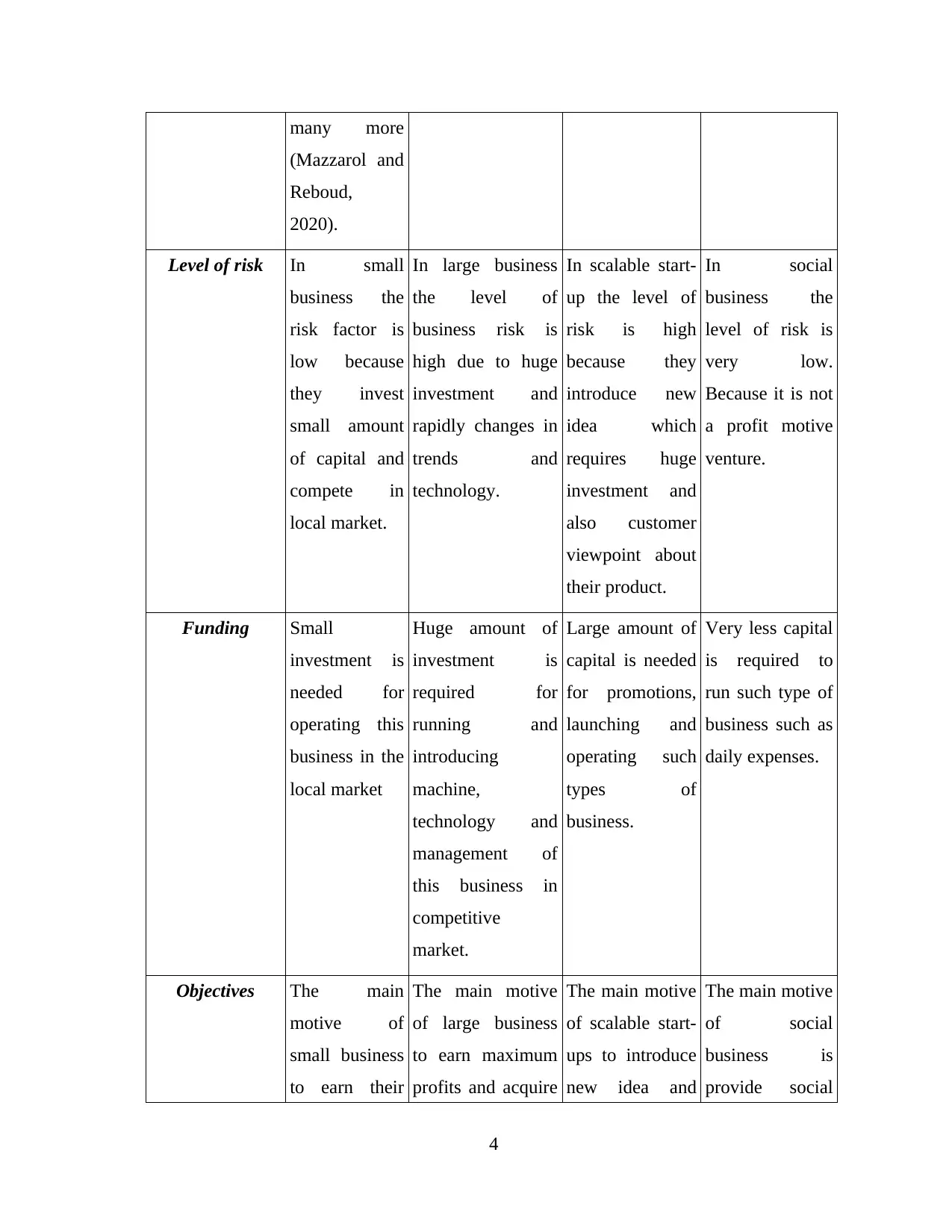
many more
(Mazzarol and
Reboud,
2020).
Level of risk In small
business the
risk factor is
low because
they invest
small amount
of capital and
compete in
local market.
In large business
the level of
business risk is
high due to huge
investment and
rapidly changes in
trends and
technology.
In scalable start-
up the level of
risk is high
because they
introduce new
idea which
requires huge
investment and
also customer
viewpoint about
their product.
In social
business the
level of risk is
very low.
Because it is not
a profit motive
venture.
Funding Small
investment is
needed for
operating this
business in the
local market
Huge amount of
investment is
required for
running and
introducing
machine,
technology and
management of
this business in
competitive
market.
Large amount of
capital is needed
for promotions,
launching and
operating such
types of
business.
Very less capital
is required to
run such type of
business such as
daily expenses.
Objectives The main
motive of
small business
to earn their
The main motive
of large business
to earn maximum
profits and acquire
The main motive
of scalable start-
ups to introduce
new idea and
The main motive
of social
business is
provide social
4
(Mazzarol and
Reboud,
2020).
Level of risk In small
business the
risk factor is
low because
they invest
small amount
of capital and
compete in
local market.
In large business
the level of
business risk is
high due to huge
investment and
rapidly changes in
trends and
technology.
In scalable start-
up the level of
risk is high
because they
introduce new
idea which
requires huge
investment and
also customer
viewpoint about
their product.
In social
business the
level of risk is
very low.
Because it is not
a profit motive
venture.
Funding Small
investment is
needed for
operating this
business in the
local market
Huge amount of
investment is
required for
running and
introducing
machine,
technology and
management of
this business in
competitive
market.
Large amount of
capital is needed
for promotions,
launching and
operating such
types of
business.
Very less capital
is required to
run such type of
business such as
daily expenses.
Objectives The main
motive of
small business
to earn their
The main motive
of large business
to earn maximum
profits and acquire
The main motive
of scalable start-
ups to introduce
new idea and
The main motive
of social
business is
provide social
4
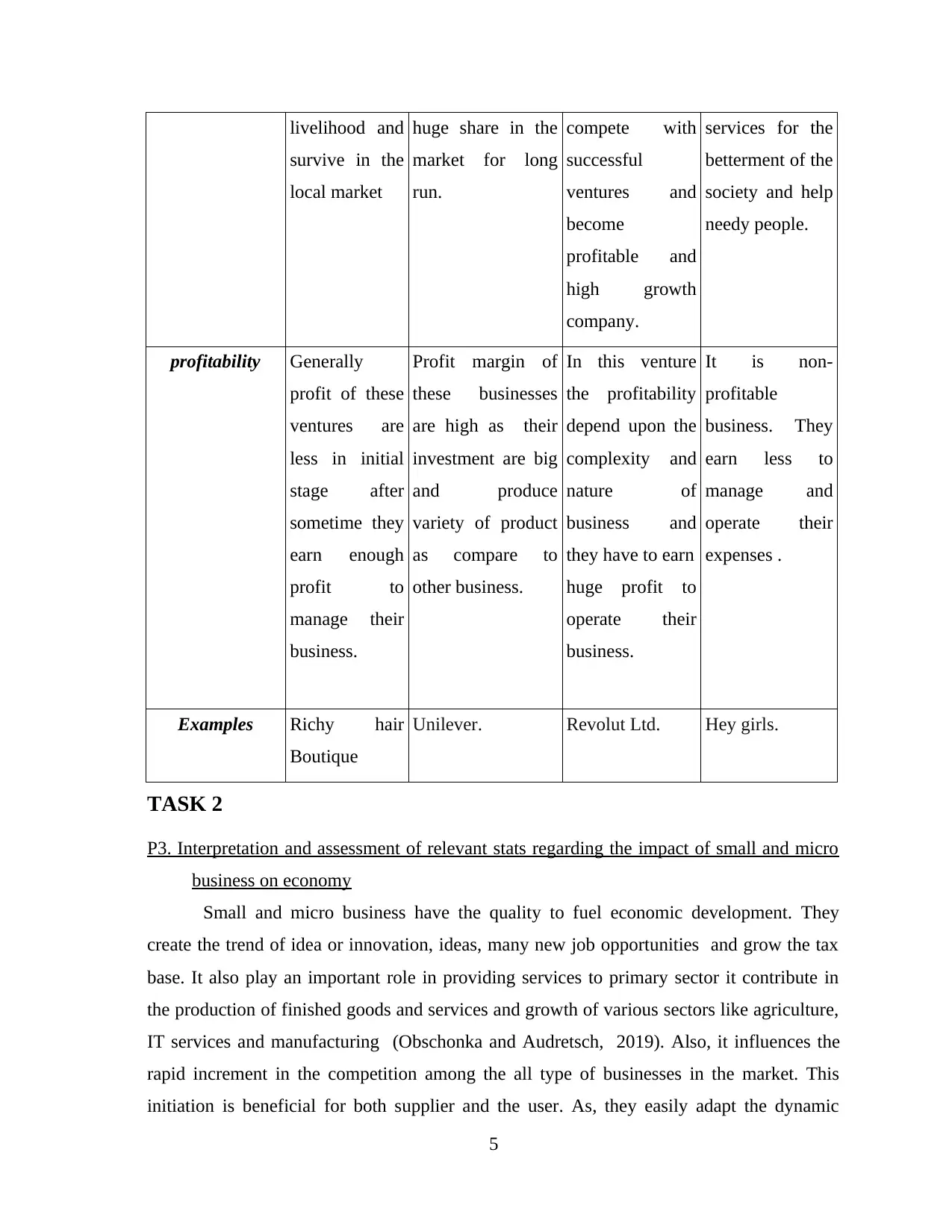
livelihood and
survive in the
local market
huge share in the
market for long
run.
compete with
successful
ventures and
become
profitable and
high growth
company.
services for the
betterment of the
society and help
needy people.
profitability Generally
profit of these
ventures are
less in initial
stage after
sometime they
earn enough
profit to
manage their
business.
Profit margin of
these businesses
are high as their
investment are big
and produce
variety of product
as compare to
other business.
In this venture
the profitability
depend upon the
complexity and
nature of
business and
they have to earn
huge profit to
operate their
business.
It is non-
profitable
business. They
earn less to
manage and
operate their
expenses .
Examples Richy hair
Boutique
Unilever. Revolut Ltd. Hey girls.
TASK 2
P3. Interpretation and assessment of relevant stats regarding the impact of small and micro
business on economy
Small and micro business have the quality to fuel economic development. They
create the trend of idea or innovation, ideas, many new job opportunities and grow the tax
base. It also play an important role in providing services to primary sector it contribute in
the production of finished goods and services and growth of various sectors like agriculture,
IT services and manufacturing (Obschonka and Audretsch, 2019). Also, it influences the
rapid increment in the competition among the all type of businesses in the market. This
initiation is beneficial for both supplier and the user. As, they easily adapt the dynamic
5
survive in the
local market
huge share in the
market for long
run.
compete with
successful
ventures and
become
profitable and
high growth
company.
services for the
betterment of the
society and help
needy people.
profitability Generally
profit of these
ventures are
less in initial
stage after
sometime they
earn enough
profit to
manage their
business.
Profit margin of
these businesses
are high as their
investment are big
and produce
variety of product
as compare to
other business.
In this venture
the profitability
depend upon the
complexity and
nature of
business and
they have to earn
huge profit to
operate their
business.
It is non-
profitable
business. They
earn less to
manage and
operate their
expenses .
Examples Richy hair
Boutique
Unilever. Revolut Ltd. Hey girls.
TASK 2
P3. Interpretation and assessment of relevant stats regarding the impact of small and micro
business on economy
Small and micro business have the quality to fuel economic development. They
create the trend of idea or innovation, ideas, many new job opportunities and grow the tax
base. It also play an important role in providing services to primary sector it contribute in
the production of finished goods and services and growth of various sectors like agriculture,
IT services and manufacturing (Obschonka and Audretsch, 2019). Also, it influences the
rapid increment in the competition among the all type of businesses in the market. This
initiation is beneficial for both supplier and the user. As, they easily adapt the dynamic
5
Paraphrase This Document
Need a fresh take? Get an instant paraphrase of this document with our AI Paraphraser
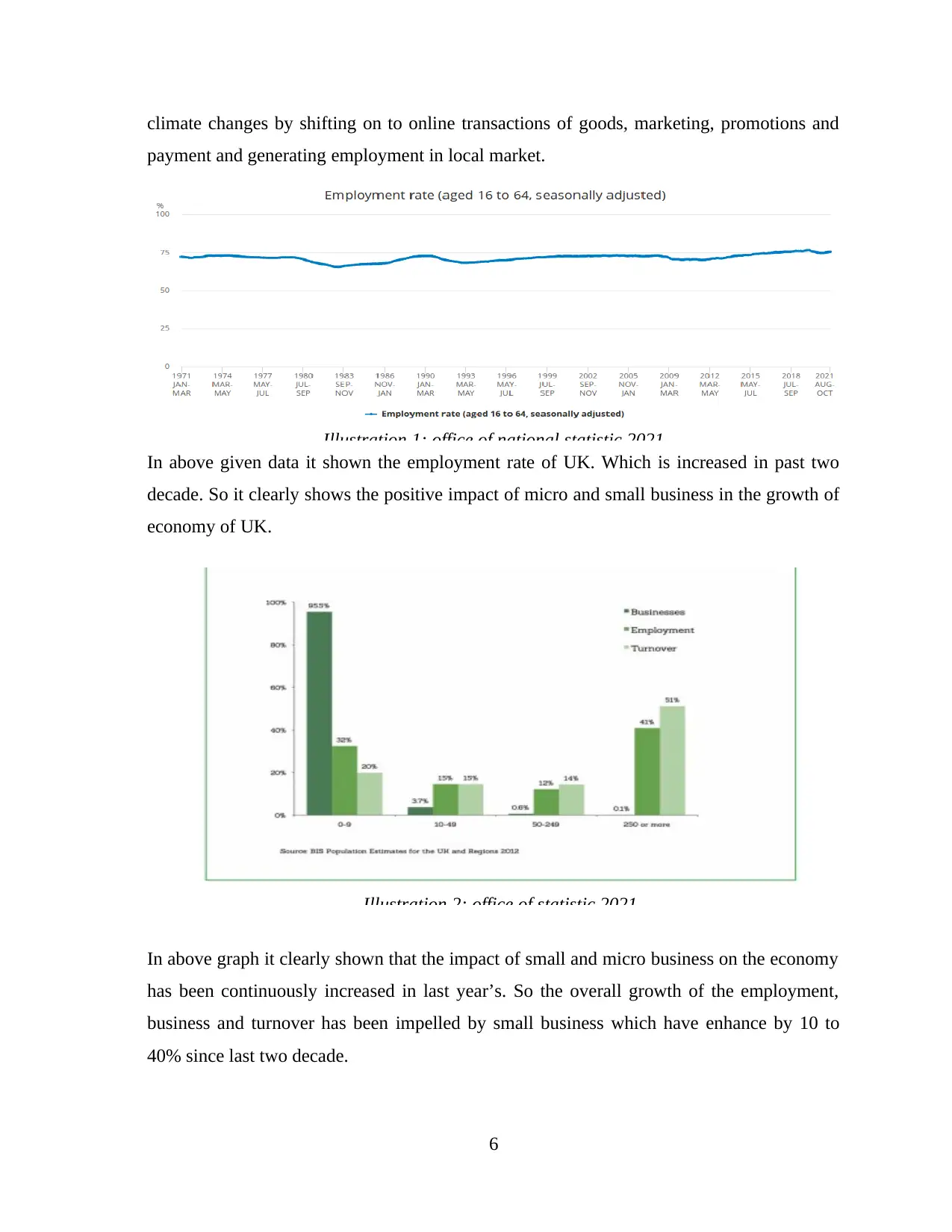
climate changes by shifting on to online transactions of goods, marketing, promotions and
payment and generating employment in local market.
Illustration 1: office of national statistic,2021
In above given data it shown the employment rate of UK. Which is increased in past two
decade. So it clearly shows the positive impact of micro and small business in the growth of
economy of UK.
In above graph it clearly shown that the impact of small and micro business on the economy
has been continuously increased in last year’s. So the overall growth of the employment,
business and turnover has been impelled by small business which have enhance by 10 to
40% since last two decade.
6
Illustration 2: office of statistic,2021
payment and generating employment in local market.
Illustration 1: office of national statistic,2021
In above given data it shown the employment rate of UK. Which is increased in past two
decade. So it clearly shows the positive impact of micro and small business in the growth of
economy of UK.
In above graph it clearly shown that the impact of small and micro business on the economy
has been continuously increased in last year’s. So the overall growth of the employment,
business and turnover has been impelled by small business which have enhance by 10 to
40% since last two decade.
6
Illustration 2: office of statistic,2021
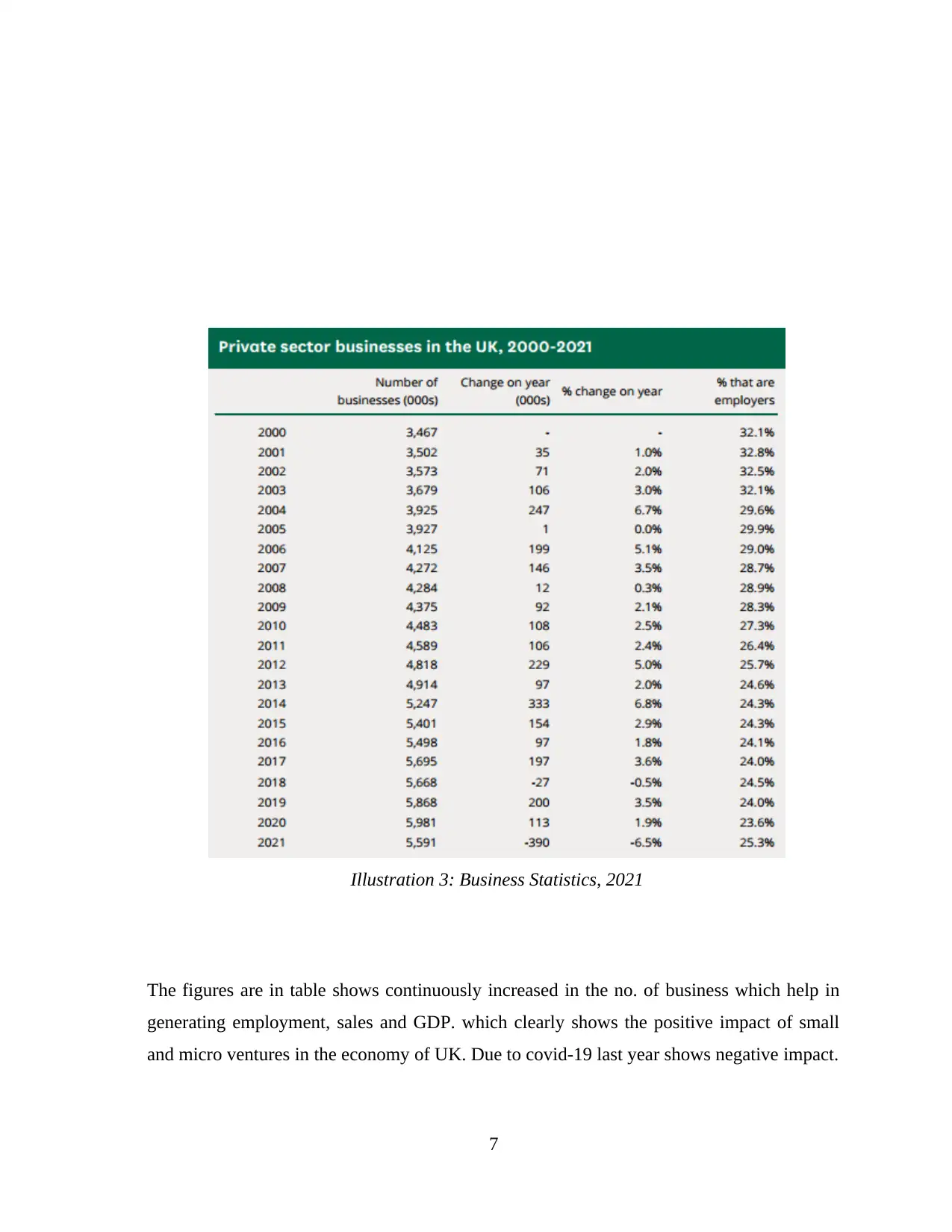
The figures are in table shows continuously increased in the no. of business which help in
generating employment, sales and GDP. which clearly shows the positive impact of small
and micro ventures in the economy of UK. Due to covid-19 last year shows negative impact.
7
Illustration 3: Business Statistics, 2021
generating employment, sales and GDP. which clearly shows the positive impact of small
and micro ventures in the economy of UK. Due to covid-19 last year shows negative impact.
7
Illustration 3: Business Statistics, 2021
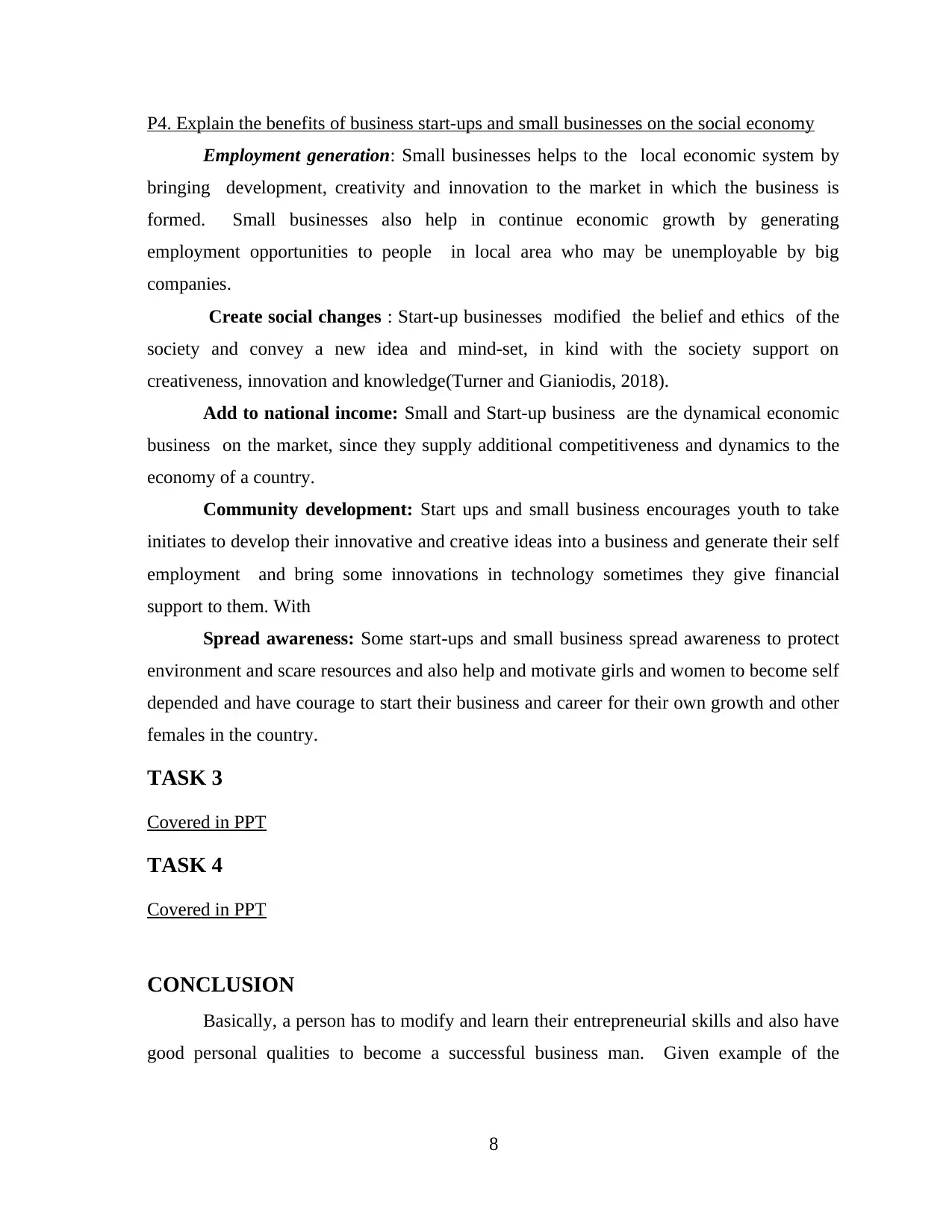
P4. Explain the benefits of business start-ups and small businesses on the social economy
Employment generation: Small businesses helps to the local economic system by
bringing development, creativity and innovation to the market in which the business is
formed. Small businesses also help in continue economic growth by generating
employment opportunities to people in local area who may be unemployable by big
companies.
Create social changes : Start-up businesses modified the belief and ethics of the
society and convey a new idea and mind-set, in kind with the society support on
creativeness, innovation and knowledge(Turner and Gianiodis, 2018).
Add to national income: Small and Start-up business are the dynamical economic
business on the market, since they supply additional competitiveness and dynamics to the
economy of a country.
Community development: Start ups and small business encourages youth to take
initiates to develop their innovative and creative ideas into a business and generate their self
employment and bring some innovations in technology sometimes they give financial
support to them. With
Spread awareness: Some start-ups and small business spread awareness to protect
environment and scare resources and also help and motivate girls and women to become self
depended and have courage to start their business and career for their own growth and other
females in the country.
TASK 3
Covered in PPT
TASK 4
Covered in PPT
CONCLUSION
Basically, a person has to modify and learn their entrepreneurial skills and also have
good personal qualities to become a successful business man. Given example of the
8
Employment generation: Small businesses helps to the local economic system by
bringing development, creativity and innovation to the market in which the business is
formed. Small businesses also help in continue economic growth by generating
employment opportunities to people in local area who may be unemployable by big
companies.
Create social changes : Start-up businesses modified the belief and ethics of the
society and convey a new idea and mind-set, in kind with the society support on
creativeness, innovation and knowledge(Turner and Gianiodis, 2018).
Add to national income: Small and Start-up business are the dynamical economic
business on the market, since they supply additional competitiveness and dynamics to the
economy of a country.
Community development: Start ups and small business encourages youth to take
initiates to develop their innovative and creative ideas into a business and generate their self
employment and bring some innovations in technology sometimes they give financial
support to them. With
Spread awareness: Some start-ups and small business spread awareness to protect
environment and scare resources and also help and motivate girls and women to become self
depended and have courage to start their business and career for their own growth and other
females in the country.
TASK 3
Covered in PPT
TASK 4
Covered in PPT
CONCLUSION
Basically, a person has to modify and learn their entrepreneurial skills and also have
good personal qualities to become a successful business man. Given example of the
8
Secure Best Marks with AI Grader
Need help grading? Try our AI Grader for instant feedback on your assignments.

entrepreneur traits are high level of confidence, desire learning and adaptable, not afraid to
take risk, understands failure, leadership quality and ambitious towards their goals.
9
take risk, understands failure, leadership quality and ambitious towards their goals.
9
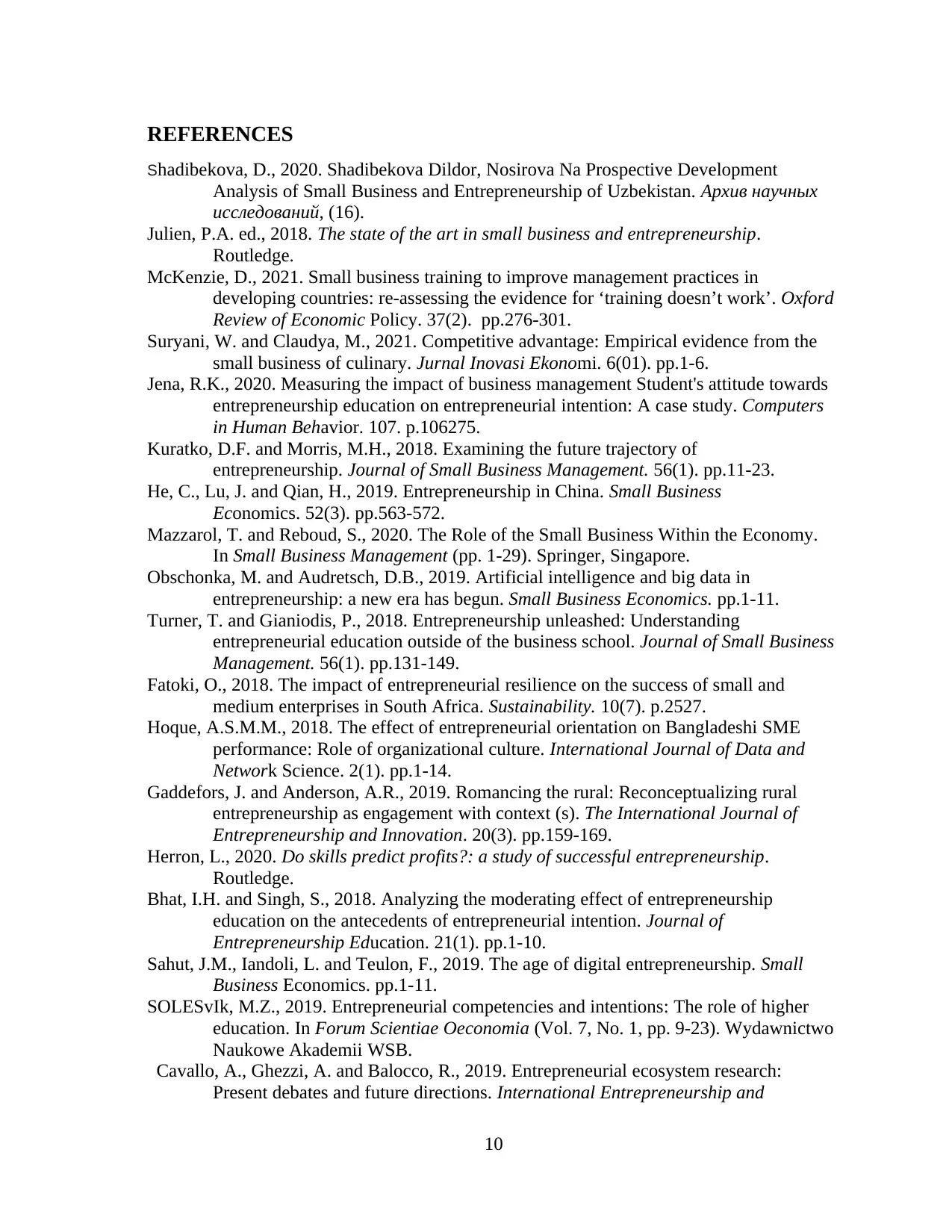
REFERENCES
Shadibekova, D., 2020. Shadibekova Dildor, Nosirova Na Prospective Development
Analysis of Small Business and Entrepreneurship of Uzbekistan. Архив научных
исследований, (16).
Julien, P.A. ed., 2018. The state of the art in small business and entrepreneurship.
Routledge.
McKenzie, D., 2021. Small business training to improve management practices in
developing countries: re-assessing the evidence for ‘training doesn’t work’. Oxford
Review of Economic Policy. 37(2). pp.276-301.
Suryani, W. and Claudya, M., 2021. Competitive advantage: Empirical evidence from the
small business of culinary. Jurnal Inovasi Ekonomi. 6(01). pp.1-6.
Jena, R.K., 2020. Measuring the impact of business management Student's attitude towards
entrepreneurship education on entrepreneurial intention: A case study. Computers
in Human Behavior. 107. p.106275.
Kuratko, D.F. and Morris, M.H., 2018. Examining the future trajectory of
entrepreneurship. Journal of Small Business Management. 56(1). pp.11-23.
He, C., Lu, J. and Qian, H., 2019. Entrepreneurship in China. Small Business
Economics. 52(3). pp.563-572.
Mazzarol, T. and Reboud, S., 2020. The Role of the Small Business Within the Economy.
In Small Business Management (pp. 1-29). Springer, Singapore.
Obschonka, M. and Audretsch, D.B., 2019. Artificial intelligence and big data in
entrepreneurship: a new era has begun. Small Business Economics. pp.1-11.
Turner, T. and Gianiodis, P., 2018. Entrepreneurship unleashed: Understanding
entrepreneurial education outside of the business school. Journal of Small Business
Management. 56(1). pp.131-149.
Fatoki, O., 2018. The impact of entrepreneurial resilience on the success of small and
medium enterprises in South Africa. Sustainability. 10(7). p.2527.
Hoque, A.S.M.M., 2018. The effect of entrepreneurial orientation on Bangladeshi SME
performance: Role of organizational culture. International Journal of Data and
Network Science. 2(1). pp.1-14.
Gaddefors, J. and Anderson, A.R., 2019. Romancing the rural: Reconceptualizing rural
entrepreneurship as engagement with context (s). The International Journal of
Entrepreneurship and Innovation. 20(3). pp.159-169.
Herron, L., 2020. Do skills predict profits?: a study of successful entrepreneurship.
Routledge.
Bhat, I.H. and Singh, S., 2018. Analyzing the moderating effect of entrepreneurship
education on the antecedents of entrepreneurial intention. Journal of
Entrepreneurship Education. 21(1). pp.1-10.
Sahut, J.M., Iandoli, L. and Teulon, F., 2019. The age of digital entrepreneurship. Small
Business Economics. pp.1-11.
SOLESvIk, M.Z., 2019. Entrepreneurial competencies and intentions: The role of higher
education. In Forum Scientiae Oeconomia (Vol. 7, No. 1, pp. 9-23). Wydawnictwo
Naukowe Akademii WSB.
Cavallo, A., Ghezzi, A. and Balocco, R., 2019. Entrepreneurial ecosystem research:
Present debates and future directions. International Entrepreneurship and
10
Shadibekova, D., 2020. Shadibekova Dildor, Nosirova Na Prospective Development
Analysis of Small Business and Entrepreneurship of Uzbekistan. Архив научных
исследований, (16).
Julien, P.A. ed., 2018. The state of the art in small business and entrepreneurship.
Routledge.
McKenzie, D., 2021. Small business training to improve management practices in
developing countries: re-assessing the evidence for ‘training doesn’t work’. Oxford
Review of Economic Policy. 37(2). pp.276-301.
Suryani, W. and Claudya, M., 2021. Competitive advantage: Empirical evidence from the
small business of culinary. Jurnal Inovasi Ekonomi. 6(01). pp.1-6.
Jena, R.K., 2020. Measuring the impact of business management Student's attitude towards
entrepreneurship education on entrepreneurial intention: A case study. Computers
in Human Behavior. 107. p.106275.
Kuratko, D.F. and Morris, M.H., 2018. Examining the future trajectory of
entrepreneurship. Journal of Small Business Management. 56(1). pp.11-23.
He, C., Lu, J. and Qian, H., 2019. Entrepreneurship in China. Small Business
Economics. 52(3). pp.563-572.
Mazzarol, T. and Reboud, S., 2020. The Role of the Small Business Within the Economy.
In Small Business Management (pp. 1-29). Springer, Singapore.
Obschonka, M. and Audretsch, D.B., 2019. Artificial intelligence and big data in
entrepreneurship: a new era has begun. Small Business Economics. pp.1-11.
Turner, T. and Gianiodis, P., 2018. Entrepreneurship unleashed: Understanding
entrepreneurial education outside of the business school. Journal of Small Business
Management. 56(1). pp.131-149.
Fatoki, O., 2018. The impact of entrepreneurial resilience on the success of small and
medium enterprises in South Africa. Sustainability. 10(7). p.2527.
Hoque, A.S.M.M., 2018. The effect of entrepreneurial orientation on Bangladeshi SME
performance: Role of organizational culture. International Journal of Data and
Network Science. 2(1). pp.1-14.
Gaddefors, J. and Anderson, A.R., 2019. Romancing the rural: Reconceptualizing rural
entrepreneurship as engagement with context (s). The International Journal of
Entrepreneurship and Innovation. 20(3). pp.159-169.
Herron, L., 2020. Do skills predict profits?: a study of successful entrepreneurship.
Routledge.
Bhat, I.H. and Singh, S., 2018. Analyzing the moderating effect of entrepreneurship
education on the antecedents of entrepreneurial intention. Journal of
Entrepreneurship Education. 21(1). pp.1-10.
Sahut, J.M., Iandoli, L. and Teulon, F., 2019. The age of digital entrepreneurship. Small
Business Economics. pp.1-11.
SOLESvIk, M.Z., 2019. Entrepreneurial competencies and intentions: The role of higher
education. In Forum Scientiae Oeconomia (Vol. 7, No. 1, pp. 9-23). Wydawnictwo
Naukowe Akademii WSB.
Cavallo, A., Ghezzi, A. and Balocco, R., 2019. Entrepreneurial ecosystem research:
Present debates and future directions. International Entrepreneurship and
10

Management Journal. 15(4). pp.1291-1321.
11
11
Paraphrase This Document
Need a fresh take? Get an instant paraphrase of this document with our AI Paraphraser

12
1 out of 14
Related Documents
Your All-in-One AI-Powered Toolkit for Academic Success.
+13062052269
info@desklib.com
Available 24*7 on WhatsApp / Email
![[object Object]](/_next/static/media/star-bottom.7253800d.svg)
Unlock your academic potential
© 2024 | Zucol Services PVT LTD | All rights reserved.




